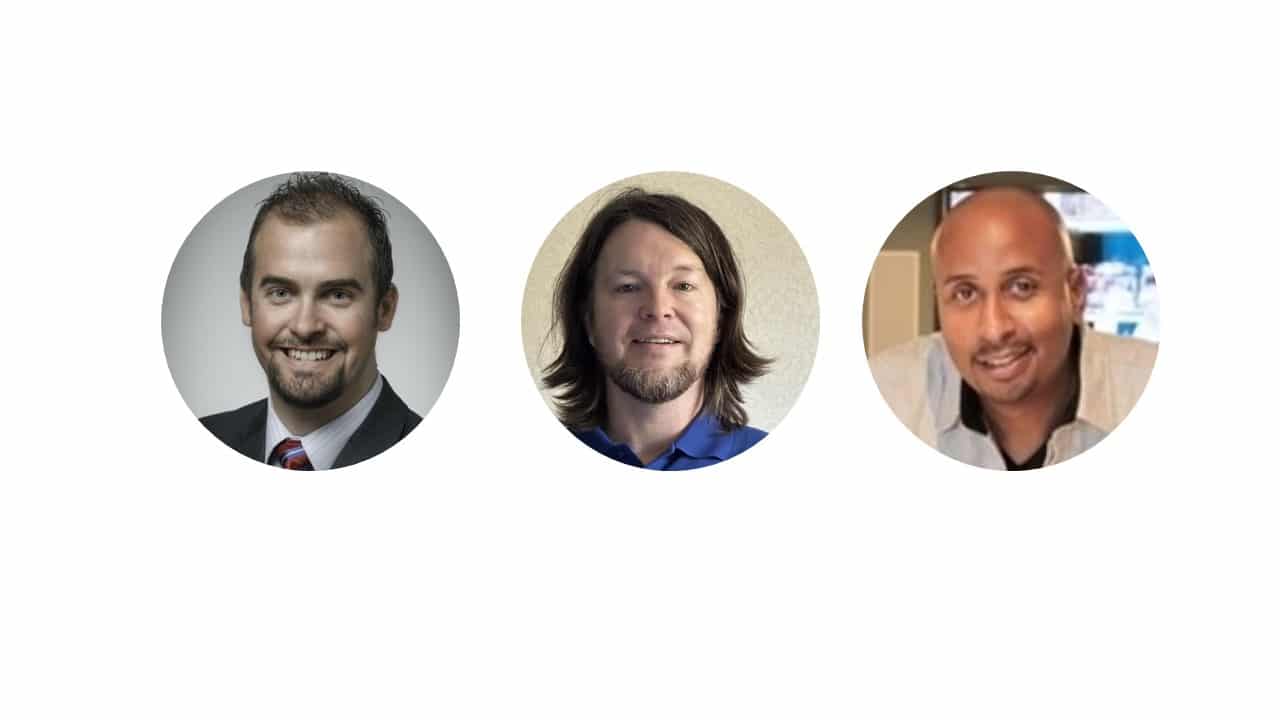The impressive stories of three entrepreneurs and online Duke Cybersecurity Students
By Emilia Chiscop-Head
Chase Dupre, Justin Hayes and James Leonard came to Duke to gain knowledge from top industry and academic leaders.

Three successful entrepreneurs are on their way to completing the Cybersecurity Master of Engineering Program at Duke University. They recently visited the Campus for their fall residency – the in-person component of the Cybersecurity ME online program, designed to provide online students with the opportunity to connect with their peers, professors and the many resources that Duke has to offer.
Senior Director at Baker Hughes, Chase Dupre helped build the company’s Cloud Security Program from scratch.
Chase Dupre, Senior Director of Cybersecurity at Baker Hughes, is responsible for global identity and access management and cloud security. He became interested in cybersecurity when his previous employer, General Electric merged with Baker Hughes. Chase had worked with GE after he earned his Computer Science degree from SE Louisiana University: he first got a job with GE Capital in Connecticut from where he moved to London. “After GE Oil & Gas merged with Baker Hughes, I had the opportunity to build the Cloud Security program. And over time my portfolio grew bigger and bigger,” he said. Chase came to Duke to advance his education. After earning an MBA from Rice University, he decided to apply for the Master of Engineering in Cybersecurity at the Pratt School of Engineering. One of his favorite classes is Machine Learning, where he had the chance of “learning about cutting edge technologies, content that is hard to find in other programs,” he said. This is in his eyes the main strength of the Duke Cyber program – the strong connection with the industry and a curriculum that is constantly updated to capture newest trends and priorities in the field.
Founder and CFO of Evlos Technology, James Leonard enrolled in the Duke Cyber master’s program after earning a PhD in Business and a third bachelor’s degree, in Cyber.
James Leonard – President, CFO, CISO and founding partner of a Maryland based company EVLOS Technology (whose name is “solve” read backwards) – has the same opinion. “The courses are very up to date and industry related. When I take a class, I expect to learn about things that I experienced in my career. in the Master’s of Cybersecurity program I learn about cutting edge last week’s occurrences, from industry and academic best leaders in cybersecurity. This is very important and powerful because we are not only learning the fundamentals of cybersecurity, but we are also learning the latest best practices to safeguard rapidly changing technology and threats to cybersecurity,” said James. He started his company a decade ago. Now, Evlos Technology has 85 employees, mostly software engineers, systems administrators, and virtual infrastructure architecture and engineering.
“There is a huge demand for cybersecurity, and I was aware of it. I went back to get an excellent Bachelor of Professional Studies in Cybersecurity Administration at Syracuse University later in my career. Their faculty taught me that I had a passion for cybersecurity. I like the concept of having to provide the countermeasures to protect the systems that make organizations more effective,” said James (a systems engineer with 22 years of experience). James has earned a collection of academic degrees including a Master of Policy Management from Georgetown, a Master of Engineering from Catholic University, an MBA from the Kenan-Flagler school of business at UNC Chapel Hill, and a PHD in Business Administration from Oklahoma State.
Justin D. Hayes is a cyber awareness consultant and will work with the U.S. State Department after graduation.
Justin D. Hayes is in his first year at Duke. From Hawaii, Justin came to Duke to gain knowledge in cybersecurity, a field he noticed a void in while working with the startup CyberReef Solutions.
Justin earned his BA and MS from Indiana University, Bloomington focusing on Education and Entrepreneurship. Immediately after graduation, he started a consultancy business in brand management with clients in Europe, UAE, and Southeast Asia. “For the first four years, I traveled to a new country every three months, meeting with the Prime Ministers and the top 50 CEOs of each developing country to talk about the importance of foreign direct investment,” he said. In 2010 he came back to the US to work in business development and strategy for high tech companies.
While a student at Duke, he is working as a small business consultant in mobile cybersecurity and cyber awareness. “My goal is to have a career where I add value to the cyber community. I have accepted a conditional offer with the U.S. State Department to work as a Diplomatic Technology Officer starting 2025, after graduation,” he told me. Justin is excited about the Duke Cybersecurity Master of Engineering program because it grants nontraditional students from all professional backgrounds the ability to learn from the best CISO’s and brightest peers in the industry via practice and not just theory. More so, the program grants him the competitive edge to make a micro pivot in his 15-year career by helping him merge his passions of technology and business.
